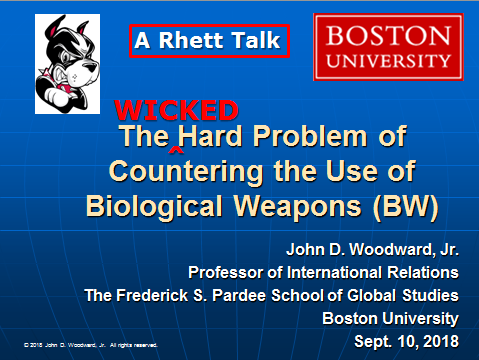Woodward Gives Rhett Talk on Biological Weapons Threat
John D. Woodward, Jr., Professor of the Practice of International Relations at the Frederick S. Pardee School of Global Studies at Boston University, delivered a September 10, 2018 BU Rhett Talk on the topic, “The Wicked, Hard Problem of Countering the Use of Biological Weapons” before approximately 150 students and faculty at Kilachand Hall.
Rhett Talks are BU’s version of the popular TEDx talks. In his presentation, Woodward discussed the growing risks and difficult intelligence and national security challenges posed by biological weapons (BW).
Prior to coming to the Pardee School in 2015, Woodward spent over thirty years in the U.S. national security community, including 21 years as a CIA officer and eight years as a senior analyst at the RAND Corporation. Drawing on his experience, he addressed various issues related to the BW threat, including:
- The significant threat of BW in terms of the scale and extent of potential for death and harm.
- The uniquely difficult challenge of countering BW: Countering the BW threat is a classic “hard problem” for the intelligence and national security community, in part because it crosses many different disciplines.
- The hard problem of countering BW will only get harder because of advances in the life sciences and information technologies, such as genome editing.
- These advances mean that the BW threat is increasingly posed by individuals and terrorists, not just nation states.
- Devising better policy approaches is necessary but no easy task.
Dr. Elizabeth Co, a senior lecturer in biology, and Dr. Sam Deese, a senior lecturer in social sciences at CGS, also spoke. Rhett Talks are sponsored by BU’s Faculty-in-Residence program, with assistance from the Dean of Students Office and Residence Life. You can learn more about BU’s Rhett Talks here.
Woodward is a former Central Intelligence Agency officer who, during his twenty-year CIA career, served as an operations officer in the Clandestine Service and as a technical intelligence officer in the Directorate of Science and Technology, with assignments in Washington D.C., East Asia, Africa, South Asia, and the Middle East. He also served as the Director of the U.S. Department of Defense Biometrics Management Office from 2003-2005 where he received the Army’s third highest civilian award for his work on using biometric technologies to identify national security threats.
